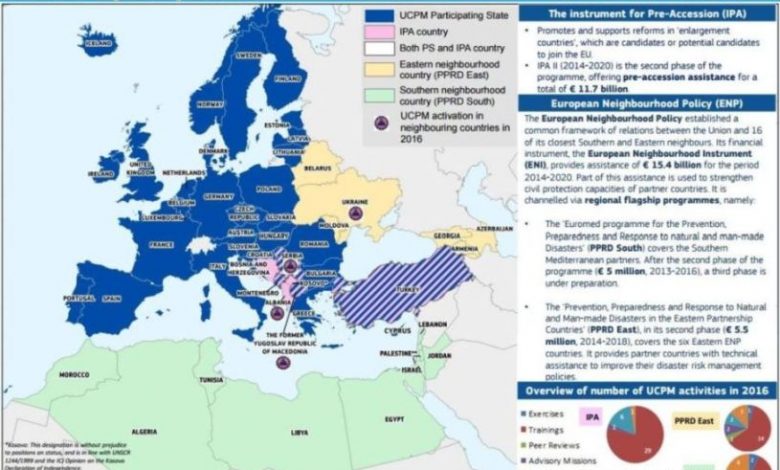European Commission revised European Neighborhood Policy
May 25 European Commission unveils new European Neighborhood Policy
The planned revision of the European Neighborhood Policy – the format of relations between the European Union and the countries of Eastern Europe and the Mediterranean basin – was initiated by Brussels in 2010 and gained particular relevance at the beginning of this year after the revolutionary events in Tunisia, Egypt and Libya.
In Brussels yesterday, European Commissioner for Enlargement and ENP Stefan Fule, as well as EU High Representative for Foreign and Security Policy Catherine Ashton, presented a communiqué of the new ENP strategy. Given the situation in the region, the format of relations between the EC and the Mediterranean countries has undergone the greatest changes, as well as general provisions affecting Ukraine. Sections on the Eastern Partnership. The EaP unites Ukraine, Moldova, Georgia, Armenia, Azerbaijan and Belarus; they also turned out to be rewritten.
The main news in the section “Strengthening the Eastern Partnership” was a reference to the criteria for membership of the EaP countries in the European Union. “The values on which the EU is based are at the center of political association and economic integration, which are offered within the framework of the Eastern Partnership. These are the same values that, in accordance with Article 49 of the European Union Treaty, should be respected by any state applying for EU membership.” , – the document says. The article mentioned in the communiqué guarantees the right to apply for EU membership to any European state that adheres to the principles of freedom, democracy, the rule of law, respect for human rights and fundamental freedoms.
Another significant change in the ENP concerns the financing of this format.
The current EU budget provides for assistance to neighboring countries in the amount of 5.7 billion euros by the end of 2013, two-thirds of which went to the Mediterranean region, and the remaining funds – to the Eastern Partnership countries. The EC intends to increase the total amount by 1.242 billion euros, while instead of the quota allocation of funds, the new principle of “more for more” will operate – the main tranches will be allocated to those countries that showed their best in the previous period.
The total amount of support will be almost 7 billion euros. “Since we seriously intend to concentrate on supporting countries where a deep reform process has been noticed, we should invest money there and not be guided by geographical priorities,” S. Fule explained.
The European Commission has unveiled a new European Neighborhood Policy. The document for the first time mentioned an article of the Treaty on the European Union, allowing the filing of an application for membership in the eastern neighbors of the EU, although Brussels emphasizes that this does not mean the prospect of membership. The EU promises to allocate 7 billion euros to the ENP, with the bulk of this amount going to countries that have demonstrated progress in establishing democracy. Ukraine’s chances of receiving substantial funding from these funds are still low – the report turned out to be about the lack of Kiev’s achievements in key areas.
The planned revision of the European Neighborhood Policy – the format of EU relations with the countries of Eastern Europe and the Mediterranean basin – was initiated by Brussels in 2010 and gained particular relevance at the beginning of this year after the revolutionary events in Tunisia, Egypt and Libya. In Brussels yesterday, European Commissioner for Enlargement and ENP Stefan Fule, as well as EU High Representative for Foreign and Security Policy Catherine Ashton, presented a communiqué of the new ENP strategy.
Given the situation in the region, the format of relations between the EC and the Mediterranean countries has undergone the greatest changes, as well as general provisions affecting Ukraine. Sections on the Eastern Partnership (EaP; unites Ukraine, Moldova, Georgia, Armenia, Azerbaijan and Belarus) have also been rewritten.
The main news in the section “Strengthening the Eastern Partnership” was a reference to the criteria for membership of the EaP countries in the European Union. “The values on which the EU is based are at the center of political association and economic integration, which are offered within the framework of the Eastern Partnership. These are the same values that, in accordance with Article 49 of the European Union Treaty, should be respected by any state applying for EU membership.” , – the document says. The article mentioned in the communiqué guarantees the right to apply for EU membership to any European state that adheres to the principles of freedom, democracy, the rule of law, respect for human rights and fundamental freedoms.
Initially, the EC planned a “more ambitious wording regarding the European perspective of the EaP countries,” but then, under pressure from EU member states, the phrase took on a more streamlined form. “We have come to the conclusion that this time (with the change in the ENP) we need to more specifically define the ultimate goal,” Stefan Füle shared with reporters. “You ask, does this mean the prospect of membership? No, it does not.”
The Ukrainian Foreign Ministry yesterday refrained from commenting on this matter. The Foreign Ministry will publish its assessment today. “Even with this wording, this is a rather positive signal,” said Yulia Tishchenko, head of the council of the Ukrainian Independent Center for Political Studies.
Another significant change in the ENP concerns the financing of this format. The current EU budget provides for assistance to neighboring countries in the amount of 5.7 billion euros by the end of 2013, two-thirds of which went to the Mediterranean region, and the remaining funds – to the Eastern Partnership countries. The EC intends to increase the total amount by 1.242 billion euros, while instead of the quota allocation of funds, the new principle of “more for more” will operate – the main tranches will be allocated to those countries that showed their best in the previous period. “Since we seriously intend to concentrate on supporting countries where a deep reform process has been noticed, we must invest there and not be guided by geographic priorities,” Mr. Fule explained.
When deciding on the distribution of EU assistance, Brussels will evaluate the recipient countries according to five criteria: the success of fair and free elections; respect for freedom of assembly and media freedom; rule of law, independent justice and fair trial; fight against corruption; Reforming special services and law enforcement agencies and ensuring democratic control over them. “Assessing the progress on these indicators, the European Union will change the level of its support for the ENP countries,” – stated in a document released yesterday.
The methodology with which Brussels intends to compare progress in the democratization of Ukraine and, for example, Armenia or Libya, will not be made public. “The commission is pondering how best to integrate the overall situation in the country, taking into account democracy, responsibility, the rule of law and sound financial management,” one of the sections of the communique says.
Experts believe that when assessing the democratic changes in the ENP countries, Brussels will not be able to avoid a subjective approach. “There is no ruler that could measure democracy in centimeters,” said Yulia Tishchenko. She also recalls that in assessing the situation in each of the ENP countries, the EU will have to apply individual criteria: “The starting positions of each country and the prospects for changes should be taken into account. Obviously, the requirements for Ukraine should be slightly higher than, for example, for Azerbaijan. And of course, the allocation of funds will take into account the interests of EU member states. “
Europe’s attention in recent months has been focused on the revolutionary Mediterranean region. The situation in the field of democratization also does not play in favor of Kiev. Yesterday, at the disposal were excerpts from the report of the European Commission on the progress of Ukraine in 2010. This document, held in a critical tone, Brussels plans to publish today.
“In Ukraine, respect for democratic standards and fundamental freedoms, such as freedom of the media and assembly, is declining,” the document says. The EC report separately noted problems with freedom of elections: “After the presidential election, which was well held at the beginning of the year, the local elections in October followed, harshly criticized by international and local observers.” Brussels also “did not see progress in the implementation of constitutional reform” and was disappointed with the judicial reform. “This law has brought some progress on a limited number of issues, but many of its provisions are highly criticized, especially regarding the risk of judicial control by the executive,” the document says.
The European Commission notes that after the change of power in the country, there have been some positive changes in the economic sphere. However, Stefan Fule yesterday stressed that when assessing progress, indicators unfavorable for Ukraine will be taken into account. “There is nothing more important than democratic values. Neither the economy nor anything else will prevail,” said the commissioner.
Ukraine – EU
According to the results of the Ukraine-EU summit, November 22, 2010, V. Yanukovych said that the key outcome of the summit was the submission by the EU of the Action Plan for the introduction of a visa-free regime, which the country will implement in 2011. The President then also noted that Ukraine and the EU reached an agreement to accelerate negotiation process to conclude an Association Agreement.
As a result of the Ukraine-EU summit, a bilateral document was signed – a protocol to the Partnership and Cooperation Agreement between Ukraine and the European Community. According to the document, Ukraine will be able to participate in all EU programs open to third countries. At the same time, Ukraine must contribute the appropriate funds to the budget of the European Union, according to the requirements of those programs in which it will participate.
On February 25, 2010, the European Parliament voted in favor of a resolution regarding Ukraine, which, in particular, contains a clause on the possibility of Kiev to request EU membership. Also, the European Parliament voted in favor of a resolution on Ukraine, which contains an appeal to the Council of the European Union to provide the EC with a mandate to develop a roadmap for a visa-free regime for Ukraine.
Ukraine and the EU began negotiations on a new agreement on March 5, 2007, and negotiations on the creation of a free trade zone on February 18, 2008. At the Ukraine-EU summit in Paris on September 9, 2008, Ukraine did not receive guarantees of EU accession. Instead, a decision was approved that the new document governing relations between Ukraine and the EU would be called an association agreement.
This post is also available in:
 English
English  Русский (Russian)
Русский (Russian)



